The Dark Side of Every Myers-Briggs® Personality Type
When it comes to the 16 Myers-Briggs® personality types, we often focus on their positive qualities and talents. In today’s article, we’re taking a look at their dark side and how that can affect their relationships and overall well-being.
Not sure what your personality type is? Take our new personality questionnaire here. Or you can take the official MBTI® here.

Table of contents
- The ENFP Dark Side
- The ENTP Dark Side
- The INFP Dark Side
- The INTP Dark Side
- The ENFJ Dark Side
- The ENTJ Dark Side
- The INFJ Dark Side
- The INTJ Dark Side
- The ESFP Dark Side
- The ESTP Dark Side
- The ISFP Dark Side
- The ISTP Dark Side
- The ESFJ Dark Side
- The ESTJ Dark Side
- The ISFJ Dark Side
- The ISTJ Dark Side
- What Are Your Thoughts?
Estimated reading time: 38 minutes
The ENFP Dark Side
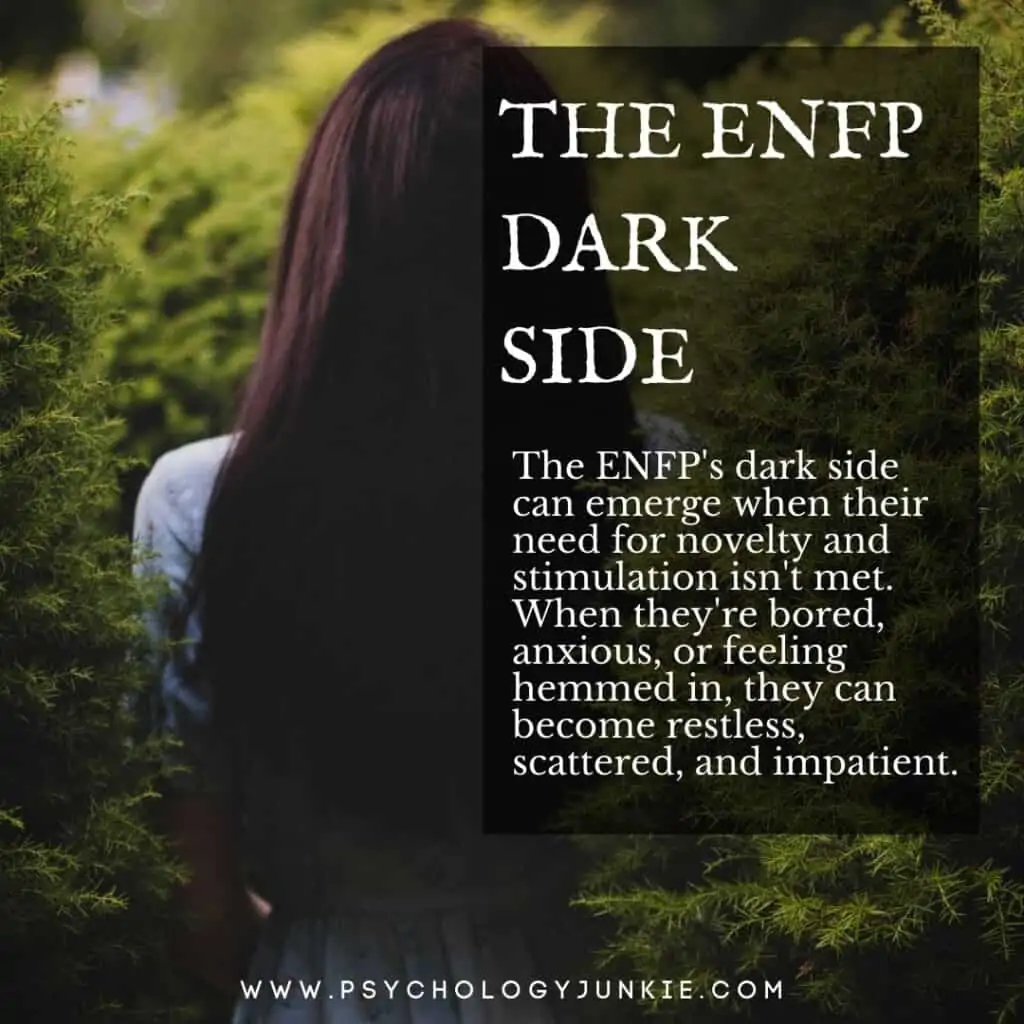
ENFPs are always on the lookout for new ideas and possibilities. They see potential in everything and everyone, and they naturally look for ways to improve upon what already exists. Sincerity is a must for this type, and they strive to be as real and authentic as they can with people. Living in accordance with their own ethics is important. They may question the pre-established societal rules of the day, but they will be true to their individual code of conduct.
At their best, ENFPs are versatile, imaginative, resilient, and visionary. They see patterns and connections that others are blind to and are often catalysts for positive change in the world. Deeply insightful, they create opportunities for others to grow and develop in ways they never would have thought possible.
However, the ENFP‘s dark side can emerge when their need for novelty and stimulation isn’t met. When they’re bored, anxious, or feeling hemmed in, they can become restless, scattered, and impatient. They may engage in risky behavior or act impulsively without considering the consequences.
The Immature ENFP
When ENFPs don’t mature or balance their need for inspiration with real-life practicality and consistency, they can become flighty, disconnected from reality, and unable to follow through on their commitments. They can also become judgmental of anyone who doesn’t align with their own idea of what’s “right” or “wrong.” It’s hard for ENFPs to take criticism when they’re at an immature level of growth. They will usually resent criticism or try to argue their side of the story relentlessly, even if their perspective isn’t logical. Eventually they may just shut out criticism and repress their true feelings in order to avoid facing the anxiety of not being right all the time.
When ENFPs Are Stressed:
When ENFPs are stressed, they usually behave in a more exaggerated fashion. They’ll become more restless, impulsive, and distractible. Often they feel pulled in a dozen different directions and are unable to stay focused. If this continues for very long, they will feel a sudden urge to “flip a switch” and behave like their opposite type (the ISTJ). This is called being in the “grip” of the inferior function. When this happens, ENFPs become uncharacteristically nitpicky, obsessed with details, and inflexible. They may become judgmental, critical, and cold. It will feel to them like they have developed tunnel vision and they have to complete a lot of busywork or do repetitive, soothing tasks.
Finding Balance:
The best way for ENFPs to stay balanced is to find time for regular downtime and reflection. ENFPs need to refuel their batteries regularly in order to avoid burnout. They should also make sure they’re surrounded by people who support and understand them. Being around people who have a wide variety of personality types is extremely healthy. This way they can get alternate perspectives for their ideas and avoid becoming too one-sided.
Read This Next: The ENFP Learning Style
The ENTP Dark Side
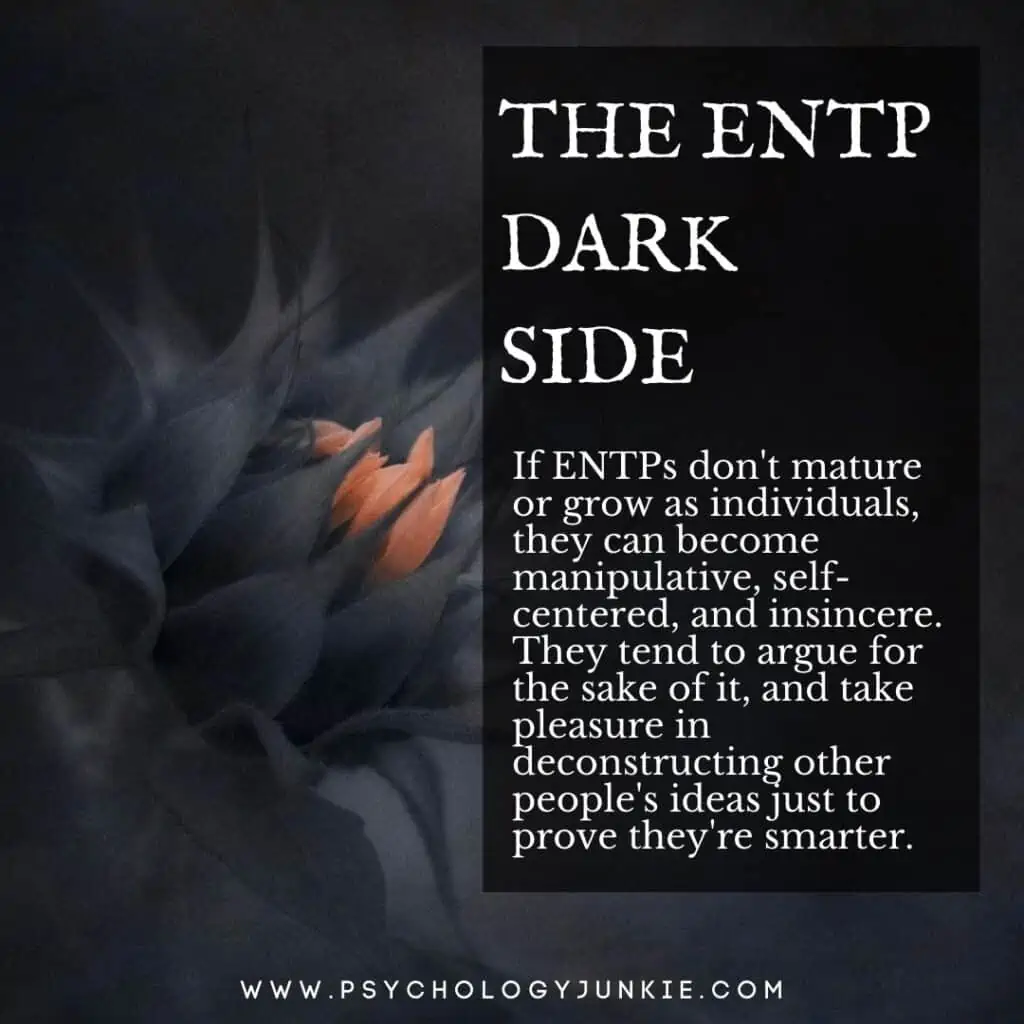
ENTPs are natural problem-solvers and idea generators. They love to think outside the box and find unusual ways to circumvent obstacles. When they’re at their best, ENTPs are charming, resourceful, and confident. They have an uncanny ability to see possibilities where others see roadblocks. They’re also excellent communicators and have a knack for persuading others to see things from their point of view.
However, the ENTP‘s dark side can emerge when their need for variety and interaction isn’t met. When they’re bored or feeling trapped, they can become anxious, scattered, and impatient. They may make impulsive decisions or take needless unnecessary risks.
The Immature ENTP
If ENTPs don’t mature or grow as individuals, they can become manipulative, self-centered, and insincere. They tend to argue for the sake of it, and take pleasure in deconstructing other people’s ideas just to prove they’re smarter. ENTPs at this level of development are highly insensitive to other people’s feelings. Yet beneath their argumentative exterior is usually someone who deeply wants approval and connection and they may seek this out in unhealthy ways.
When it comes to tasks, unhealthy ENTPs struggle to finish what they start. They leave dozens of half-finished projects in their wake and move on to something new before the previous task is complete. This can be frustrating for those who have to work with them, as it’s difficult to know what will be finished and what won’t.
When ENTPs are Stressed:
When ENTPs are stressed, they usually behave in a more exaggerated fashion. They’ll become more distractible, unfocused, and high-energy. Often they feel pulled in a dozen different directions and don’t know where to focus. If this continues for very long, they will feel a sudden urge to “flip a switch” and behave like their opposite type (the ISFJ). This is called being in the “grip” of the inferior function. When this happens, ENTPs become uncharacteristically timid, indecisive, and risk-averse. They may also become withdrawn, hyper-sensitive, and overly emotional. It will feel to them like they are angry, but they don’t know why. All the little details in their lives that normally don’t bother them suddenly become overwhelming.
Finding Balance:
The best way for ENTPs to stay balanced is by regularly challenging themselves mentally and creatively. They need to find ways to keep their minds active, whether it’s through learning new things, taking on new projects, or spending time with stimulating people. It’s also important for them to learn to slow down and focus on one thing at a time. ENTPs should come up with a strategy for finishing the tasks that are important. It’s crucial that they find a strategy that works for them and isn’t built for someone with a different mind. For example, working on one project start to finish without getting distracted might be unrealistic. But setting a goal of completing two tasks a day or taking breaks after working for an hour might be more doable.
Read This Next: The Unhealthy ENTP
The INFP Dark Side
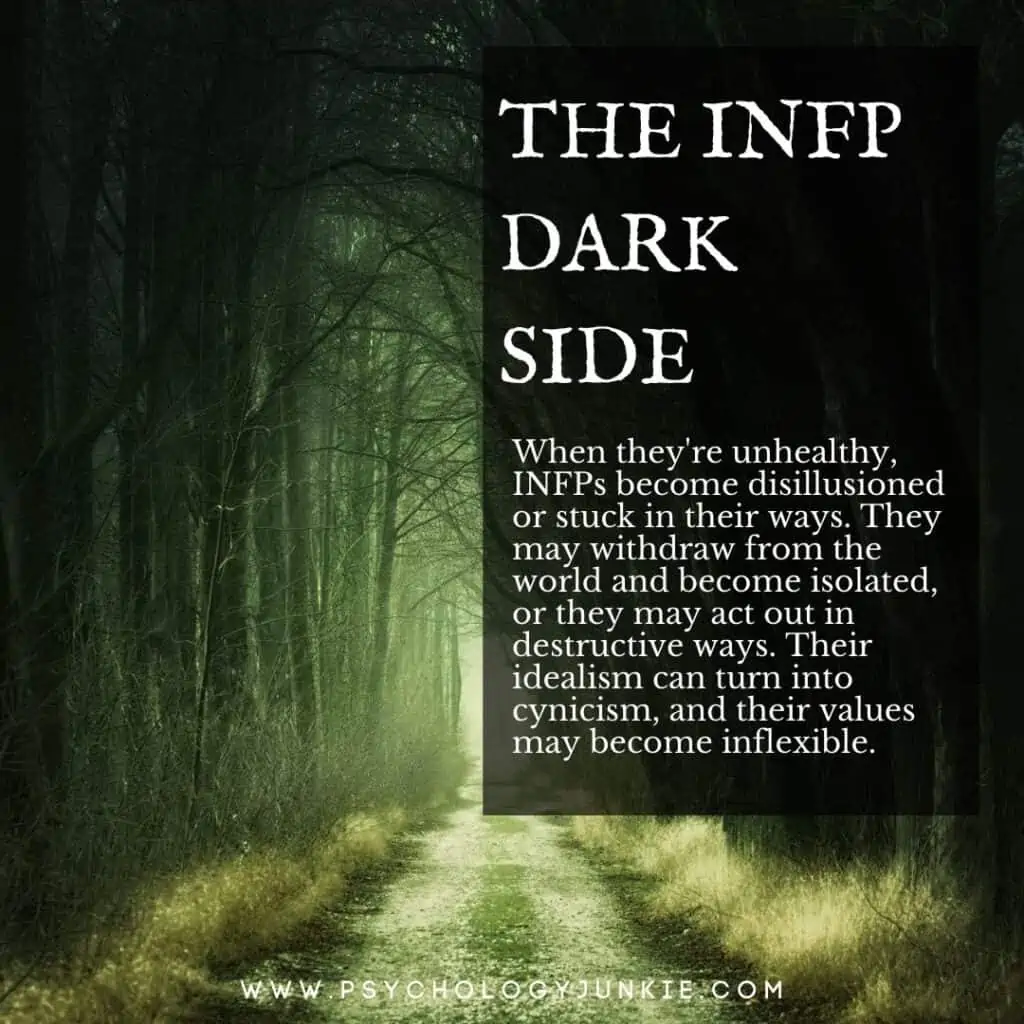
INFPs are ultimately interested in understanding the meaning of life itself. Discovering “Who am I?” and “What do I stand for?” is crucial to them. They want to know how they fit into the grand scheme of things. They are often drawn to creative or humanitarian work that allows them to explore these big questions.
When they’re at their best, INFPs are compassionate, creative, and deeply in touch with their emotions. They have a strong moral compass and are always striving to live in accordance with their values. They are supportive friends and family members who always try to see the best in people. When they’re feeling balanced, INFPs are usually happy, optimistic, and gentle.
However, when they’re unhealthy, INFPs become disillusioned or stuck in their ways. They may withdraw from the world and become isolated, or they may act out in destructive ways. Their idealism can turn into cynicism, and their values may become inflexible. When they’re in this state, INFPs are often negative, judgmental, and superior.
The Immature INFP:
Immature INFPs are often highly idealistic and deeply attached to their personal values. However, they may not have a clear understanding of what those values actually are. They may cling to certain beliefs without really knowing why they believe them. Other people feel like they have to walk on eggshells around them, because they’re afraid of saying something that will upset them.
INFPs may also become fixated on one person or cause that they believe in. They may invest all their time and energy into this thing to the exclusion of everything else. This can lead to burnout, resentment, and bitterness.
When INFPs are Stressed:
When INFPs are stressed they tend to withdraw and introspect. They may have difficulty making decisions, and they may second-guess themselves constantly. Their values may become inflexible, and they may have a hard time seeing other points of view. During these times they typically feel more emotional and may seek solace in music, books, or movies.
If stress continues or becomes extreme, they may become overwhelmed and feel the need to be more proactive, regimented, and strict. If they give into this pull, they can become stuck in the grip of their inferior function (Extraverted Thinking). When this happens, they become more commanding, aggressive, and critical. They may have an unusually low tolerance for disorder and feel like they are overwhelmed by tasks that have to be finished right away.
Finding Balance:
INFPs need to have opportunities to get in touch with themselves as well as be creative with others. This can be done through journaling, spending time in nature, or talking to someone they trust about their feelings. It’s also important for INFPs to find an activity that broadens their perspectives, such as brainstorming with others, spending time with trusted friends, or working on creative projects.
Read This Next: Dealing with Emotional Overwhelm as an INFP
The INTP Dark Side
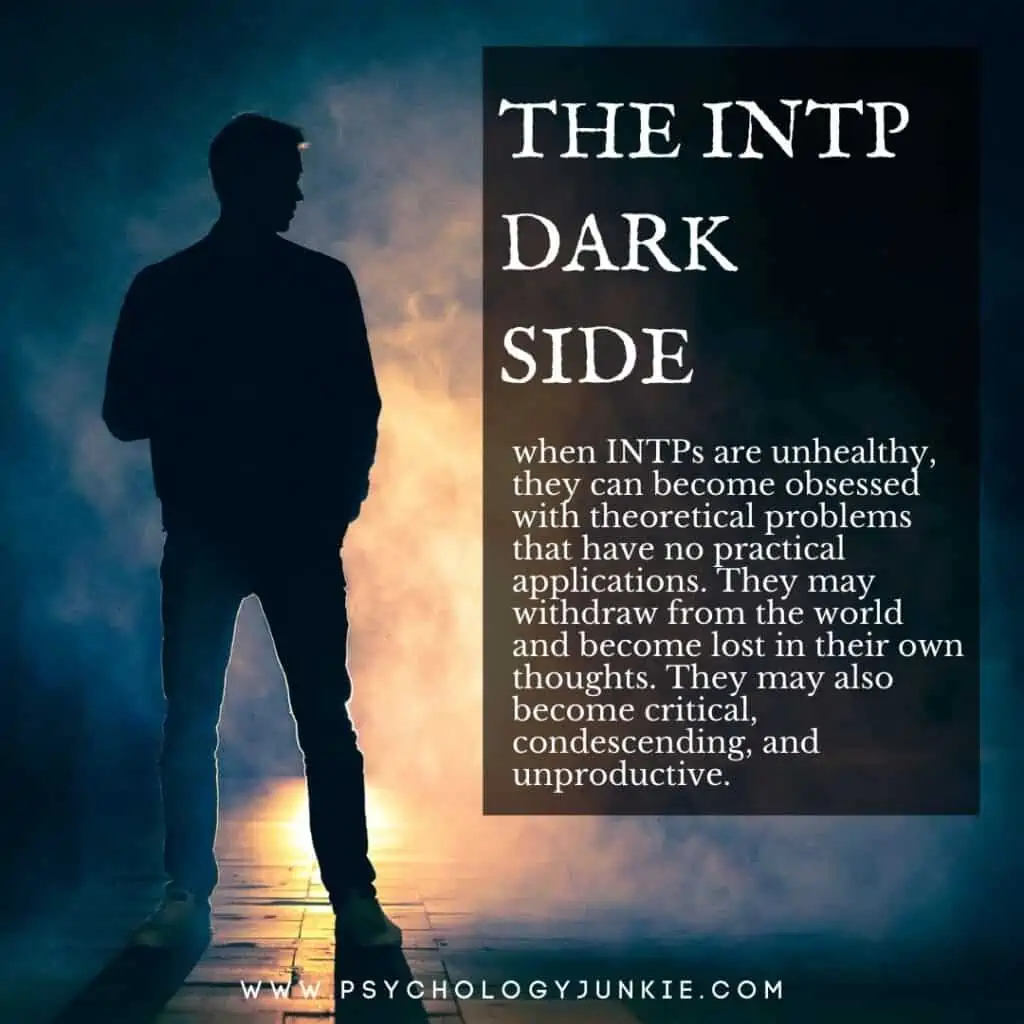
INTPs are ultimately concerned with understanding how things work. They have a knack for figuring out systems, understanding how various ideas fit together, and developing mastery over a subject. They love to find new ways of looking at things and are fascinated by complex problems.
When they’re at their best, INTPs are clear-minded, innovative, and logical. They are able to see both the forest and the trees, and they’re excellent at finding creative solutions to difficult problems.
However, when INTPs are unhealthy, they can become obsessed with theoretical problems that have no practical applications. They may withdraw from the world and become lost in their own thoughts. Their thinking can become rigid and inflexible, and they may have difficulty understanding others’ points of view. They may also become critical, condescending, and unproductive.
The Immature INTP:
INTPs who have rarely challenged themselves or stretched beyond their comfort zone can remain in an immature stage of development. When this happens, they may become cynical, jaded, and negative. It can be difficult for them to actualize their ideas because they are out of touch with reality and stuck in a state of analysis-paralysis. They often feel like they’re the only ones who really understand things, and everyone else is just too stupid to catch on.
Unfortunately, INTPs at this stage of development struggle to communicate their ideas clearly and get flustered as they realize their inner world is so hard to bring into the outer world. They are often impractical and forget details such as unpaid bills, physical needs, or other people’s feelings.
When INTPs are Stressed:
When INTPs begin to experience stress, they usually pull away from the outside world and try to analyze the situation. During these times they can be more reclusive, detached, and even cold. They may find themselves trying to solve the problem and trailing off into dozens of unrelated rabbit trails. Their internet browsers may have dozens of tabs left open on them as they try to research possibilities and find answers.
If stress becomes severe or chronic, INTPs may have what’s called a “grip” reaction. When this happens, they become more emotional and sensitive than usual. Often they feel like people dislike them for various reasons or that important relationships are on the brink of ruin. They feel plagued by insecurity and self-doubt, and they may start to doubt their own competence. Sometimes they erupt in outward displays of anger, hurt, or tearfulness. This is extremely embarrassing for them, and they often feel like they’ve lost control.
Finding Balance:
INTPs need to find ways to balance their inner world with the outer world around them. If they’re not getting enough time alone, they can become irritable and withdrawn. They need to schedule regular time to think, explore their interests, and recharge their batteries. However, they also need to forge meaningful relationships in the outside world. When INTPs challenge their ideas by having healthy debates, conversations, and interactions with others, they are able to gain a more objective perspective on their own thoughts. Additionally, spending time in nature can help INTPs feel grounded and connected to something larger than themselves.
Read This Next: 24 Signs That You’re an INTP, the Prodigy Personality Type
The ENFJ Dark Side
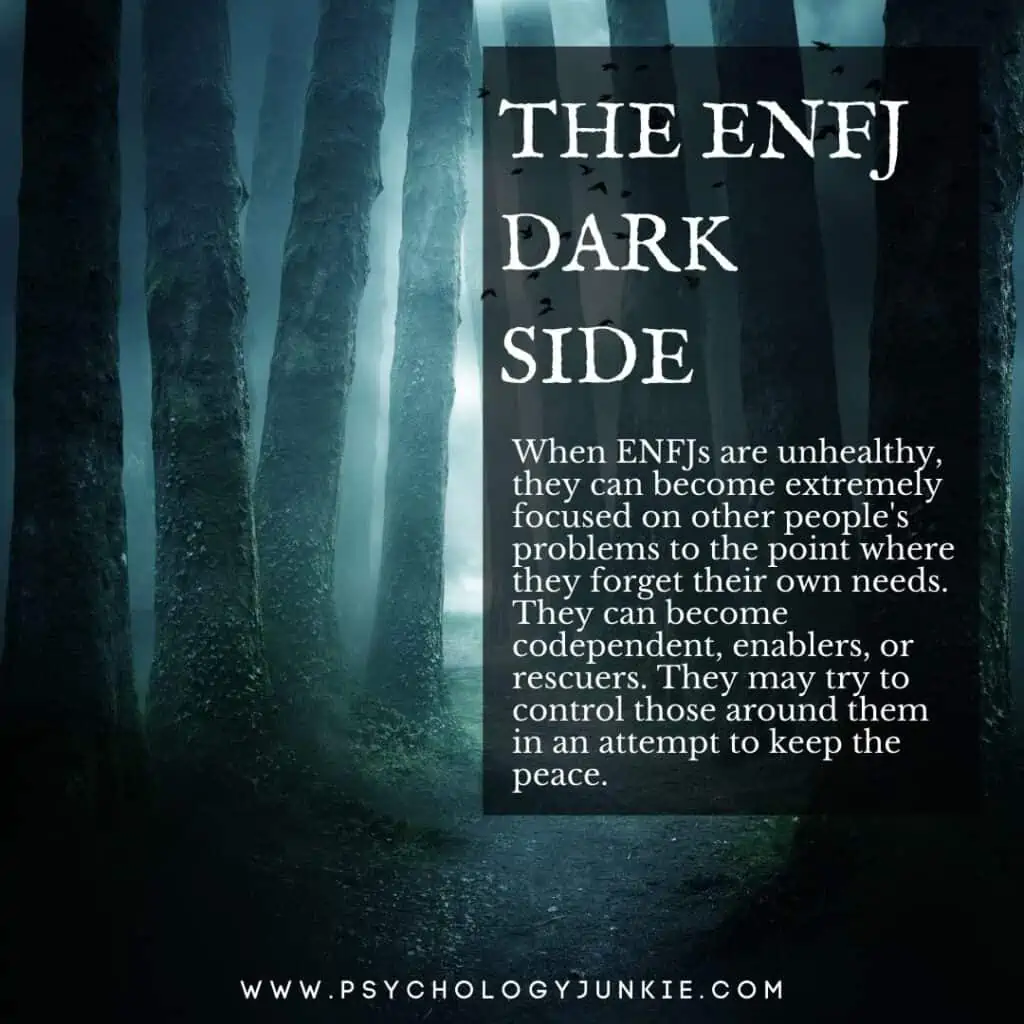
ENFJs are deeply concerned with how the people around them are feeling and are often in tune with the emotional atmosphere of the room they’re in. They can be very good at reading people and often have a strong sense of what people need. Driven by an intense inner vision of how the world could be, they are motivated to make positive changes in the lives of those around them.
At their best, ENFJs are compassionate, altruistic, and highly effective leaders. They are often able to see both the big picture and get people on board to make the world a better place. They’re good at mobilizing people and resources to achieve their vision.
When ENFJs are unhealthy, they can become extremely focused on other people’s problems to the point where they forget their own needs. They can become codependent, enablers, or rescuers. They may try to control those around them in an attempt to keep the peace. This often leads to conflict as people feel suffocated by the ENFJ‘s well-meaning but overbearing attempts to control the situation.
The Immature ENFJ:
ENFJs who have never pushed themselves to grow or stretch outside of their own perspective can become imbalanced and immature. The immature ENFJ is often someone who pushes people to conform to their ideas of what is right for the group. They may try to control or manipulate those around them in order to get their way. Additionally, they may be very judgmental and critical of others who they feel are rocking the boat unnecessarily or are violating the group’s values. These ENFJs can be “social police” who struggle to accept viewpoints that conflict with their own.
When ENFJs are Stressed:
When ENFJs first experience stress, they tend to reach out to others to try to vent or find advice and consolation. They often have a hard time discerning how to solve a problem if there are many different people who will be affected. ENFJs look for win-win solutions and if there isn’t one, they feel stuck. Additionally, if ENFJs are not getting the emotional support they need from others, they may become withdrawn and start to internalize their stress. This can lead to them feeling overwhelmed, hopeless, and depressed.
If stress becomes severe or chronic, ENFJs can experience a “grip” stress reaction. When this happens, they become more reclusive and analytical than usual. Often they nitpick their mistakes and become stuck in a state of disparaging themselves. They feel plagued by doubts and may start to second-guess their own decisions. Sometimes they erupt in anger, lashing out at those around them. This is extremely embarrassing for them, and they usually experience deep shame as a result.
Finding Balance:
ENFJs need to find ways to nourish their internal world while having healthy external relationships. This means talking to a variety of people in order to understand many different perspectives and ways of life. Healthy ENFJs are excellent listeners who enjoy having their ideas challenged in a respectful discourse.
It’s also crucial for ENFJs to not over-work themselves on account of others. They need regular time alone to recharge their batteries and get in touch with their intuitive, insightful side. Time for meditation, reflection, and relaxation is crucial for them. Additionally, ENFJs need to be careful not to take on more than they can handle or become too invested in other people’s problems.
Read This Next: 10 Things You Should Never Say to an ENFJ
The ENTJ Dark Side
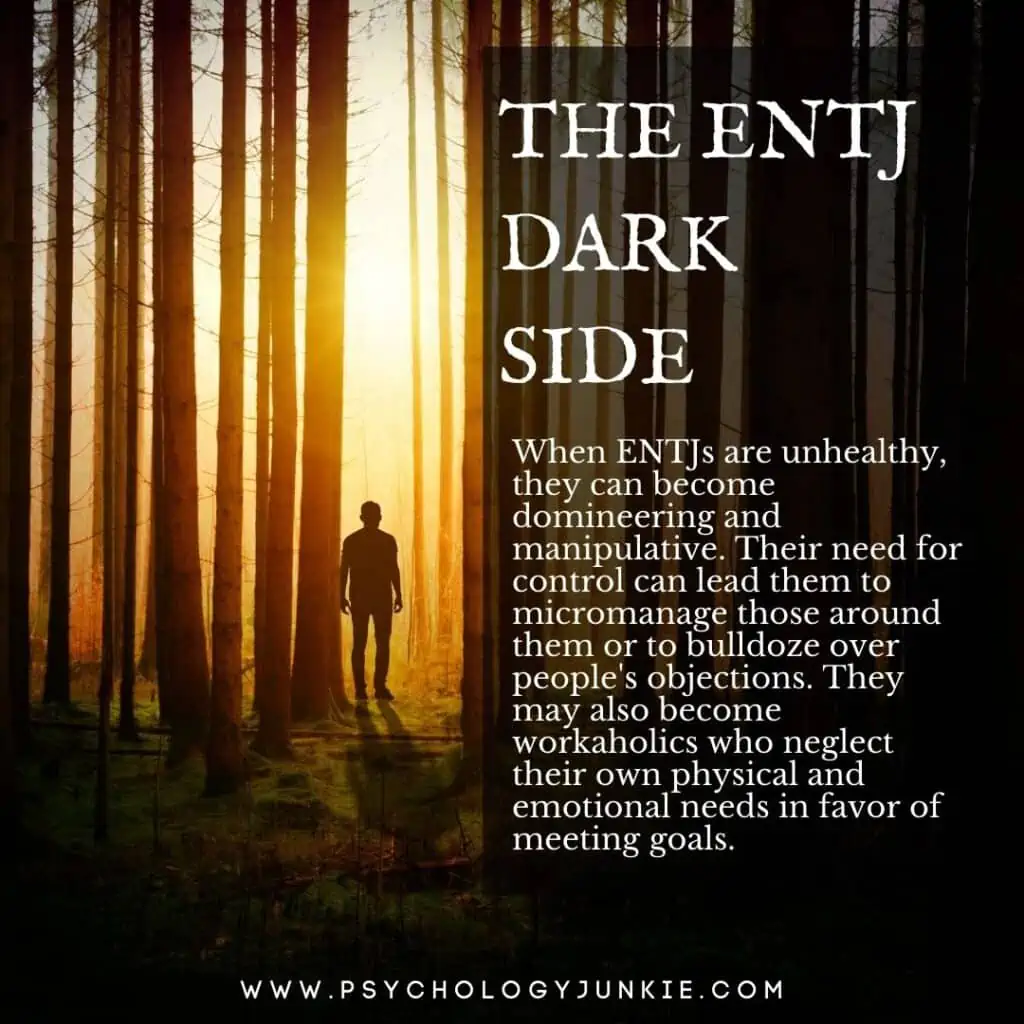
ENTJs are objective-oriented, analytical problem solvers who excel at meeting goals. They are often able to see the big picture and develop creative solutions to complex problems. When they’re at their best, ENTJs are inspiring leaders who can get other people on board with their vision. They have a natural gift for mobilizing people and resources and cutting past inefficiency or needless bureaucratic red tape.
When ENTJs are unhealthy or stressed, they can become domineering and manipulative. Their need for control can lead them to micromanage those around them or to bulldoze over people’s objections. Additionally, unhealthy ENTJs may become workaholics who neglect their own physical and emotional needs in favor of meeting goals. They may also become impatient, inflexible, and insensitive to the needs of others.
The Immature ENTJ:
When ENTJs become stuck in their own perspective and refuse to consider other points of view, they can become immature and overly dogmatic. They may become obsessed with being right and may belittle or steamroll over others who disagree with them. Additionally, they may have difficulty admitting when they’re wrong or taking feedback from others. While they want good relationships, their critical nature and insensitivity can make people turn away from them and can leave them terribly lonely.
When ENTJs are Stressed:
When ENTJs first experience stress, they tend to become more exaggerated in their preferences. They become hyper-fixated on productivity, fixing things, or organizing their world. Often they believe they can just push their way through the stress with enough will-power and hard work.
However, if stress continues or becomes extreme, ENTJs can experience a “grip” reaction. When this happens, ENTJs become overwhelmed by their emotions and have difficulty making decisions. They often feel alone and misunderstood, overwhelmed by all the tasks they’ve taken on. During these moments they tend to become hypersensitive and reclusive. They may lash out in an uncharacteristically emotional way only to regret it later.
Finding Balance:
ENTJs need to find ways to balance their go-getter personality with quality downtime and reflection. They need time alone to introspect, reflect, and consider the impact of their choices and decisions. It’s also important for them to ask for help when they’re feeling overwhelmed. Additionally, it’s crucial for them to be patient with others and to try to see things from different perspectives. Practicing active listening, empathy, and self-care can help them to be more open-minded and understanding of others.
Read This Next: 10 Things ENTJs Look for in a Relationship
The INFJ Dark Side

INFJs are gifted at empathically understanding people’s feelings and motivations as well as developing insights for them. They have a visionary sense of what’s possible and are often catalysts for personal and spiritual growth in others. When they’re at their best, INFJs are creative, compassionate people who make a lasting difference in the world.
However, when they’re unhealthy, INFJs can become withdrawn and out of touch with what’s going on around them. Rather than putting their insights to good use, they tend to isolate themselves and become lost in their own private world. Additionally, unhealthy INFJs may become stubbornly attached to their ideals and lose touch with their responsibilities and obligations. They may forget to pay the bills, brush their teeth, or otherwise take care of their physical needs.
The Immature INFJ:
When INFJs don’t grow and mature as individuals, they tend to become lost in their own fantasies and daydreams. Rather than using their insights and creativity for good, they dwell in their imagination and withdraw from the world. Additionally, they may become overly attached to their ideals and have difficulty accepting the imperfections of reality.
When INFJs are Stressed:
When INFJs first experience stress, they tend to become more exaggerated in their preferences. They will usually become more aloof, withdrawn, and analytical. Much time will be spent trying to find a strategy or insight that will solve whatever is plaguing them.
If stress continues or becomes extreme, they can experience what’s called a “grip” reaction. When this happens, INFJs become scattered and unfocused. They often become more impulsive, reckless, and risk-taking. Additionally, they may have difficulty sleeping and become more prone to outbursts. After stress dissipates they tend to feel ashamed and embarrassed, wondering what came over them.
Finding Balance:
INFJs need to find ways to balance their compassionate and idealistic nature with experiences in the natural world. Getting out in nature, spending time with friends, and participating in volunteer activities can help. Additionally, it’s important for INFJs to learn to trust their intuition and get adequate alone time. Many INFJs overwork themselves on account of others and don’t get the quiet time they need. Meditation, journaling, and other creative outlets can help them to connect with their inner voice and reduce stress.
Read This Next: 7 Things That INFJs Experience As Children
The INTJ Dark Side
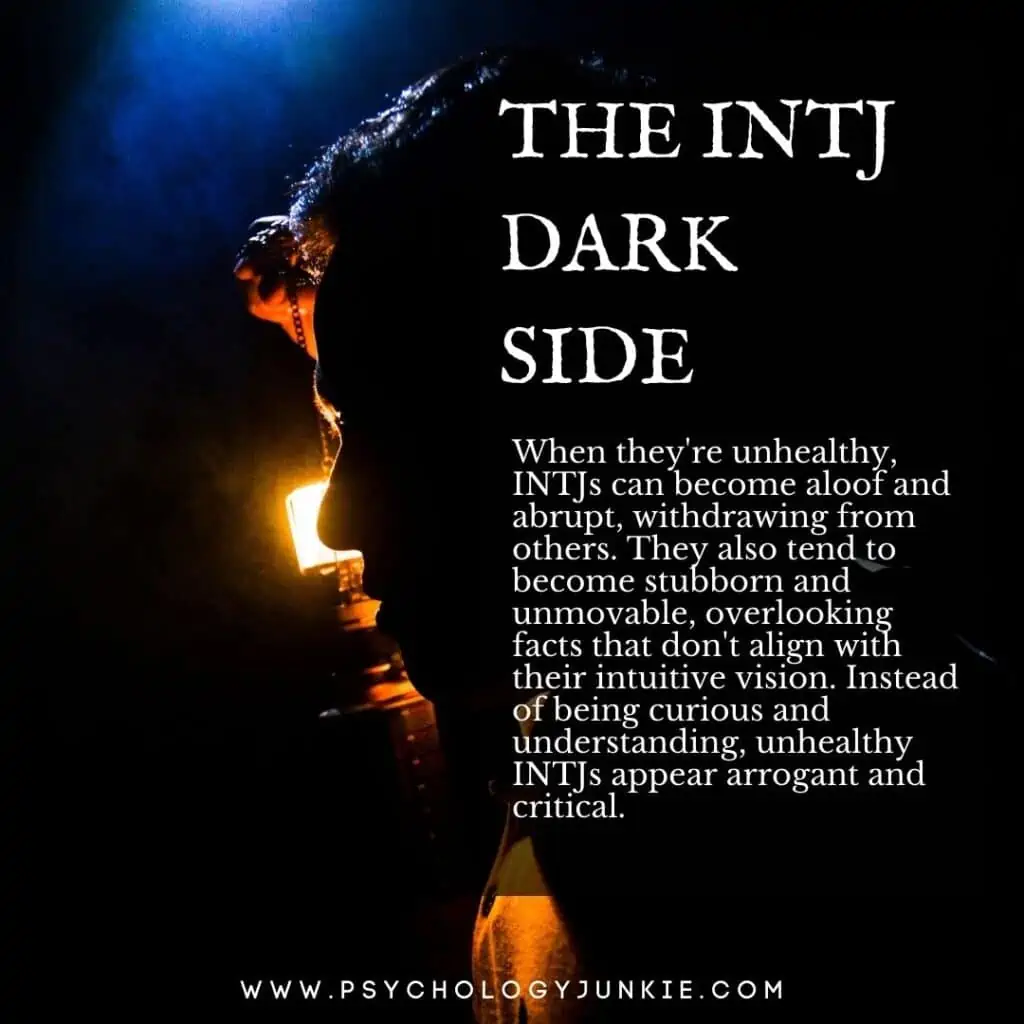
INTJs are gifted at seeing the world in terms of patterns and possibilities. They are strategic thinkers who are constantly looking for ways to achieve their goals and understand the world in a deeper way. When they’re at their best, INTJs are innovative problem-solvers with a gift for conceptualizing and predicting.
However, when they’re unhealthy, INTJs can become aloof and abrupt, withdrawing from others. They also tend to become stubborn and unmovable, overlooking facts that don’t align with their intuitive vision. Instead of being curious and understanding, unhealthy INTJs appear arrogant and critical.
The Immature INTJ:
When INTJs don’t grow and mature as individuals, they tend to become lost in their own thoughts and theories. They overlook details that come back to haunt them later, like important deadlines or bill payments. When it comes to relationships, they de-prioritize intimate connections or social niceties and come across as cold or insensitive. While they may have an abundance of ingenious ideas, they often struggle to communicate them or take action to make them a reality.
When INTJs are Stressed:
When INTJs first experience stress they behave in a more exaggerated way. They withdraw from the world and try to analyze the situation from many different angles and perspectives. Lots of time will be spent problem-solving and looking for solutions. During these times any interruption will be infuriating to them, although they might try to hide it.
If stress continues or becomes extreme, they can experience a “grip” stress reaction. When this happens, they tend to become more rash and impulsive. They may take more risks and spend money more carelessly than usual. Sometimes they channel this stress into healthy activities like exercise, but they still feel scattered and out of control.
Finding Balance:
INTJs need to make sure they’re getting enough time alone so that their stress levels aren’t skyrocketing. Quiet, planned alone time that they can depend on helps them to have peace of mind. No interruptions during this time is especially important.
It’s also crucial for INTJs to find ways to balance their rich inner world with outer-world activity. Setting measurable goals and working towards them rather than just staying in an analytical place is important. Additionally, it’s important for INTJs to nourish their relationships and find people they can trust. Part of growth involves hearing other points of view and broadening your perspective. That can be achieved through conversation, healthy debate, or even therapy.
Read This Next: 24 Signs That You’re an INTJ, the Strategist Personality Type
The ESFP Dark Side
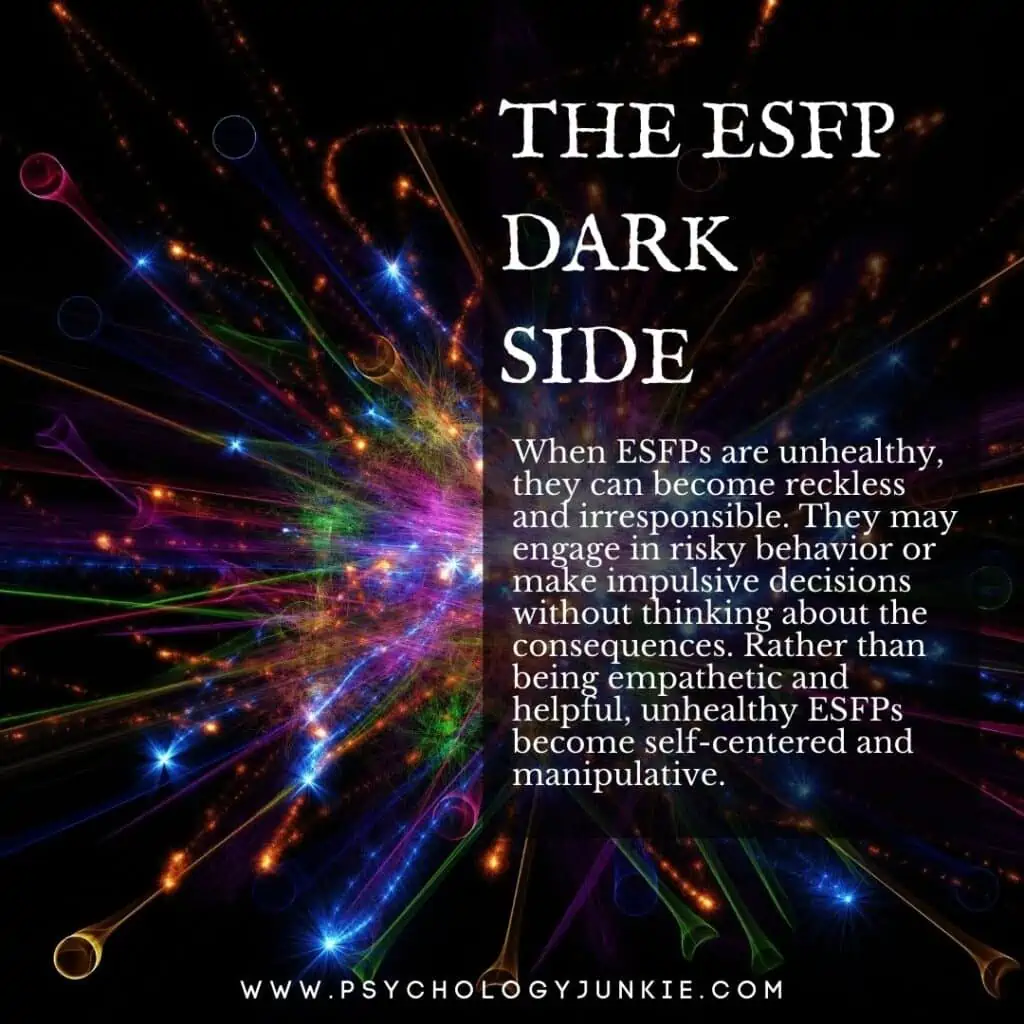
ESFPs are outgoing, friendly, and adventurous. They live to experience all the joys and thrills that life has to offer, and they want others to join them in the process. Their common sense and realistic approach to life keeps them grounded and able to handle a wide variety of challenges.
At their best, ESFPs are flexible, adaptable, and easygoing. They are keen observers of people’s behavior as well as what’s going on around them. This means that they can read people fairly quickly and can get a sense of practical needs that are going unmet. They have a special gift for helping people see the enjoyment of life. Additionally, they are usually quick to help out in a crisis
However, when ESFPs are unhealthy, they can become reckless and irresponsible. They may engage in risky behavior or make impulsive decisions without thinking about the consequences. Rather than being empathetic and helpful, unhealthy ESFPs become self-centered and manipulative, using others for their own gain.
The Immature ESFP:
When ESFPs don’t grow and mature as individuals, they become distracted and impulsive and have trouble carrying out their responsibilities. They may limit their decisions to what will be most gratifying in the moment without thinking about the future consequences. Because these ESFPs are so fixated on enjoyment and activity, they don’t pause to consider whether they’re living a life they can be proud of in the end. Rather than sitting with themselves and dealing with their vulnerabilities and deeper needs, they flit from activity to activity or person to person, looking for fun wherever they can find it.
When ESFPs are Stressed:
When ESFPs first start experiencing stress, they tend to become more exaggerated and true-to-type. They may try to distract themselves with television, activities, or exercise. Re-framing the situation or seeing the bright side is something they often try to do.
However, if stress becomes extreme or chronic, they can experience an intense “grip” reaction to stress. When this happens, they become overwhelmed by dark and gloomy visions or ideas about the future. They tend to become more reclusive and pessimistic when stressed, believing that the future inevitably will let them down. Instead of seeing possibilities for enjoyment like they usually do, they become fixated on the distant future and all the negatives it could hold.
Finding Balance:
ESFPs need to feel like they have time for fun and adventure in their lives. If every part of their day is planned out and structured, they will feel trapped and overwhelmed.
At the same time, ESFPs need to find ways to balance their fun-loving extroverted side with their more reflective introverted side. Spending time alone in nature can be reviving, as well as going for a run, or listening to music alone. Getting time alone can help ESFPs to recenter themselves and think through what matters to them and what to prioritize.
Additionally, ESFPs need to find ways to stick with their tasks when the going gets tough. This can mean giving themselves small rewards when they complete a task or breaking up a big goal into manageable steps.
Read This Next: ESFP Cognitive Function Guide
The ESTP Dark Side
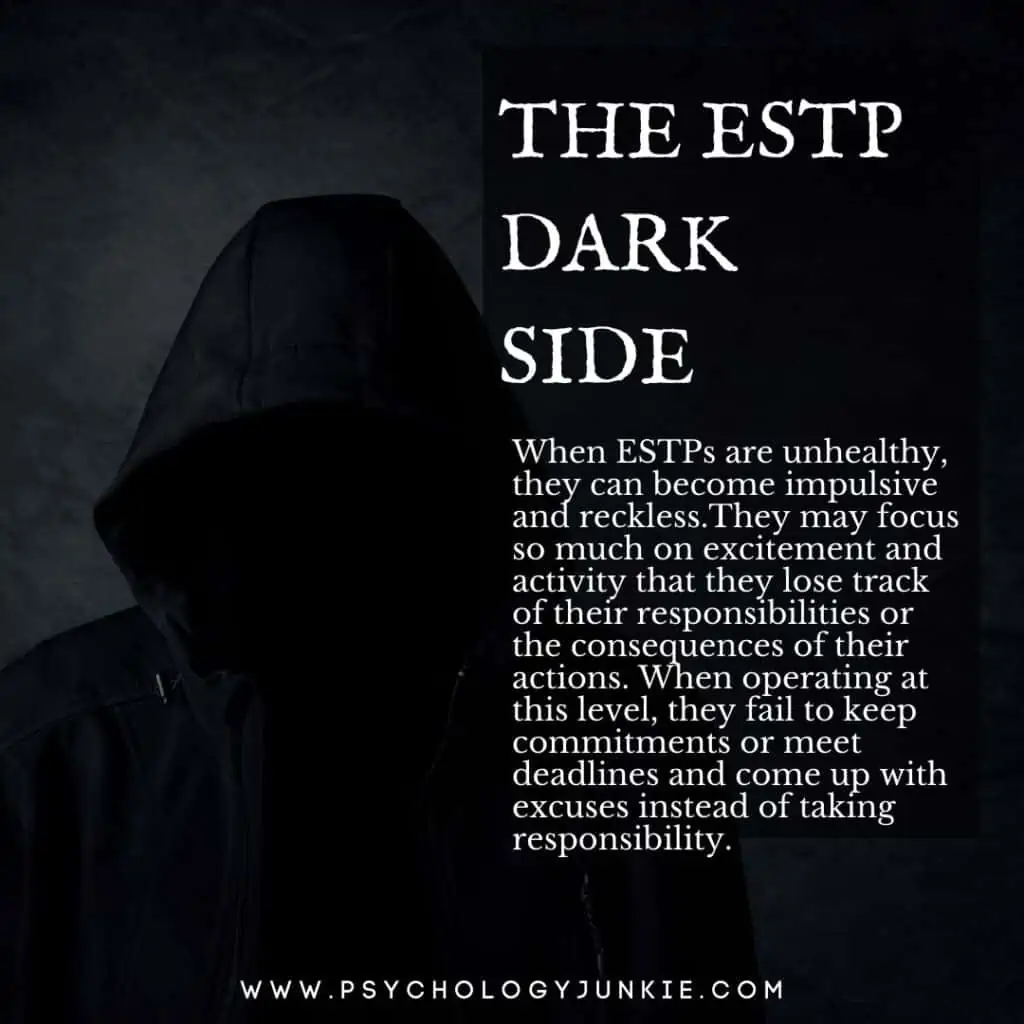
ESTPs are often outgoing, energetic, and adaptable. People with this personality type are described as “doers” who are quick on their feet and ready for action. They’re natural leaders and thrive in fast-paced environments. In a crisis, these are the types you want on your team because they can think rationally in the midst of chaos.
At their best, ESTPs are decisive, resourceful, and adaptable. They’re always up for a challenge and have a down-to-earth, charming demeanor. Skilled at reading people, they are persuasive without being manipulative. They balance their adventurous side with a highly rational and logical approach to life.
However, when ESTPs are unhealthy, they can become impulsive and reckless.They may focus so much on excitement and activity that they lose track of their responsibilities or the consequences of their actions. When operating at this level, they fail to keep commitments or meet deadlines and come up with excuses instead of taking responsibility. When dealing with people they can go from being charming and manipulative to insensitive and demanding.
The Immature ESTP:
When ESTPs don’t grow and mature as individuals, they can stay stuck in their own perspective and miss out on the balance of opposing viewpoints. Immaturity can show up in a variety of ways, but most commonly it shows up in pleasure-seeking at the expense of long-term well-being. Immature ESTPs tend to de-value their thinking side and put most of their energy into their sensing side. This means fun, enjoyment, thrills, and excitement are always the order of the day. They fail to see the wider ramifications of their actions and can become callous and insensitive to the feelings of others.
When ESTPs Are Stressed:
When ESTPs first begin to experience stress they become more exaggrerated in their type preferences. They will try to distract themselves from the problem or face it head on impulsively. Finding a “quick fix” until a better solution presents itself is often their method for coping.
If stress becomes extreme or chronic, then ESTPs can have a “grip” reaction to it. This can cause them to make negative inferences about people and situations. They may become paranoid and see danger or betrayal everywhere.
Finding Balance:
In order for ESTPs to be healthy and happy, they need to have opportunities for freedom and fun. Unstructured time is important, and friendships are also crucial. ESTPs often enjoy active pursuits and competitions, whether that be playing sports or tabletop board games.
It’s also important for ESTPs to balance their energetic, extroverted side with a more thoughtful and deliberate approach to life. Sometimes slowing down and taking time to think things through can be helpful, even if it’s uncomfortable. Additionally, it’s important for ESTPs to learn how to stick with a task even when it’s not exciting or fun. This can mean setting small goals and giving themselves regular rewards for completing tasks.
The ISFP Dark Side
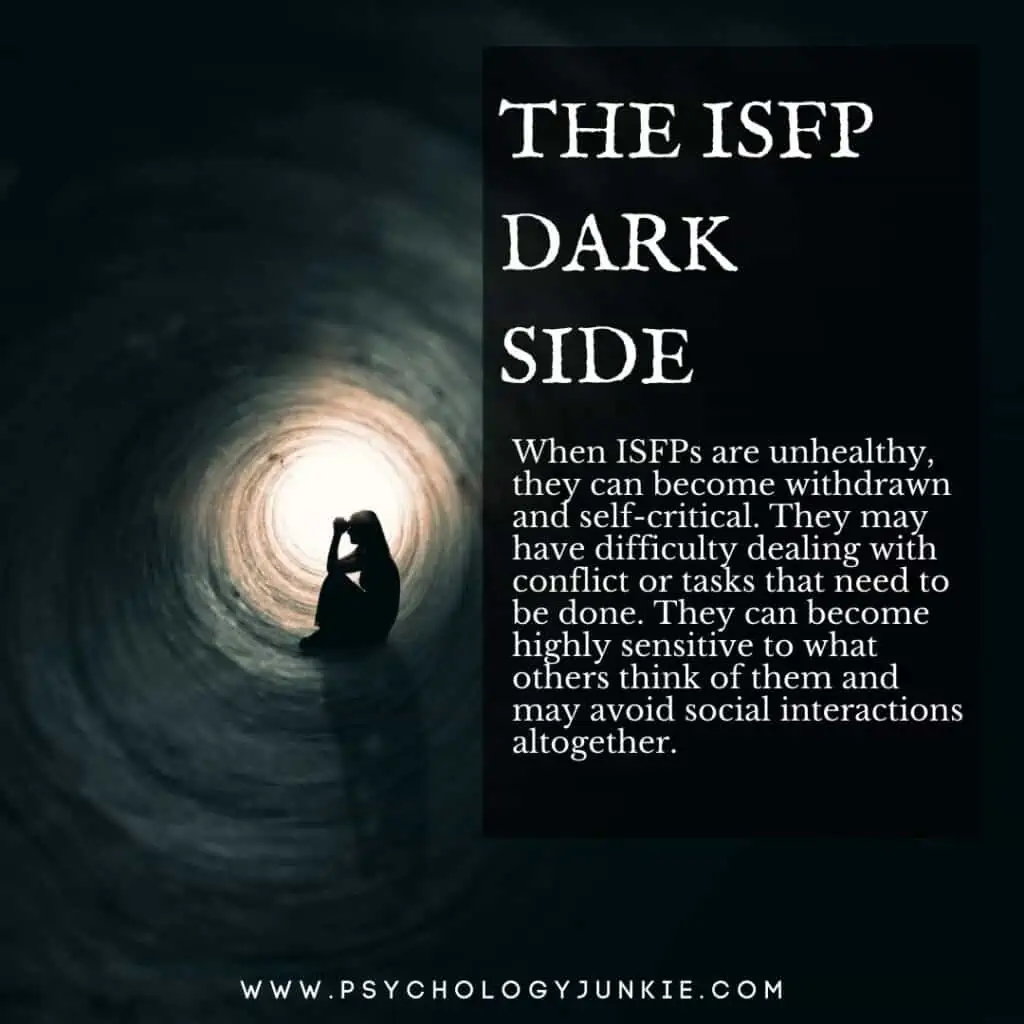
ISFPs balance a kind, gentle spirit with a pragmatic, down-to-earth personality. Often referred to as “the artists,” these types enjoy bringing their rich inner feelings out in creative ways. Whether they’re painters, chefs, or dancers, they find joy in experiencing the rich beauties of life, no matter how small.
At their best, ISFPs are highly attuned to the feelings and needs of other people. They have a deep well of empathy for others and want to contribute to the betterment of people. Considerate and sensitive, they help out in practical ways. They have a commitment to upholding their integrity and being authentic and sincere in their interactions.
However, when ISFPs are unhealthy, they can become withdrawn and self-critical. They may have difficulty dealing with conflict or criticism. They can become highly sensitive to what others think of them and may avoid social interactions altogether. Some ISFPs passively refuse to follow any rules or responsibilities laid on them and instead do their own thing, regardless of the consequences.
The Immature ISFP:
When ISFPs are immature, they may struggle to see beyond their own needs and feelings. They can become self-centered and dismissive of the needs of others. Conflict can be difficult for them to deal with, and they may avoid it at all costs. This can lead to a build-up of resentment which may eventually explode in an emotional outburst. Additionally, immature ISFPs may become highly sensitive to criticism and take everything personally. Instead of balancing their feeling and thinking sides, these ISFPs tend to believe that whatever they feel is the ultimate truth.
When ISFPs Are Stressed:
ISFPs tend to be sincere people who are driven by an inner sense of right and wrong. They balance this with being observant of the world around them and in touch with what’s relevant and real. When stressed, ISFPs become more reclusive and withdrawn. They want to be left alone so that they can sort out their emotions and prioritize what really matters to them.
If stress becomes chronic or severe, ISFPs can experience a “grip” reaction. When this happens, they become more combative, critical, and outspoken. They may become fixated on completing tasks, making demands, and organizing and re-organizing their room.
Finding Balance:
ISFPs need to find ways to balance their inner world with the outer world. This can mean setting aside time each day to reflect on their feelings and needs. It’s also important for them to find outlets for their creativity. ISFPs may enjoy journaling, painting, or spending time in nature. Additionally, ISFPs need to learn to deal with conflict in a healthy way. This can mean expressing their needs and feelings assertively instead of passive-aggressively. It can also mean taking time to talk to other people so that they can get various perspectives and feedback that enriches their understanding of life.
Read This Next: The Top 7 Gift Ideas for ISFPs
The ISTP Dark Side
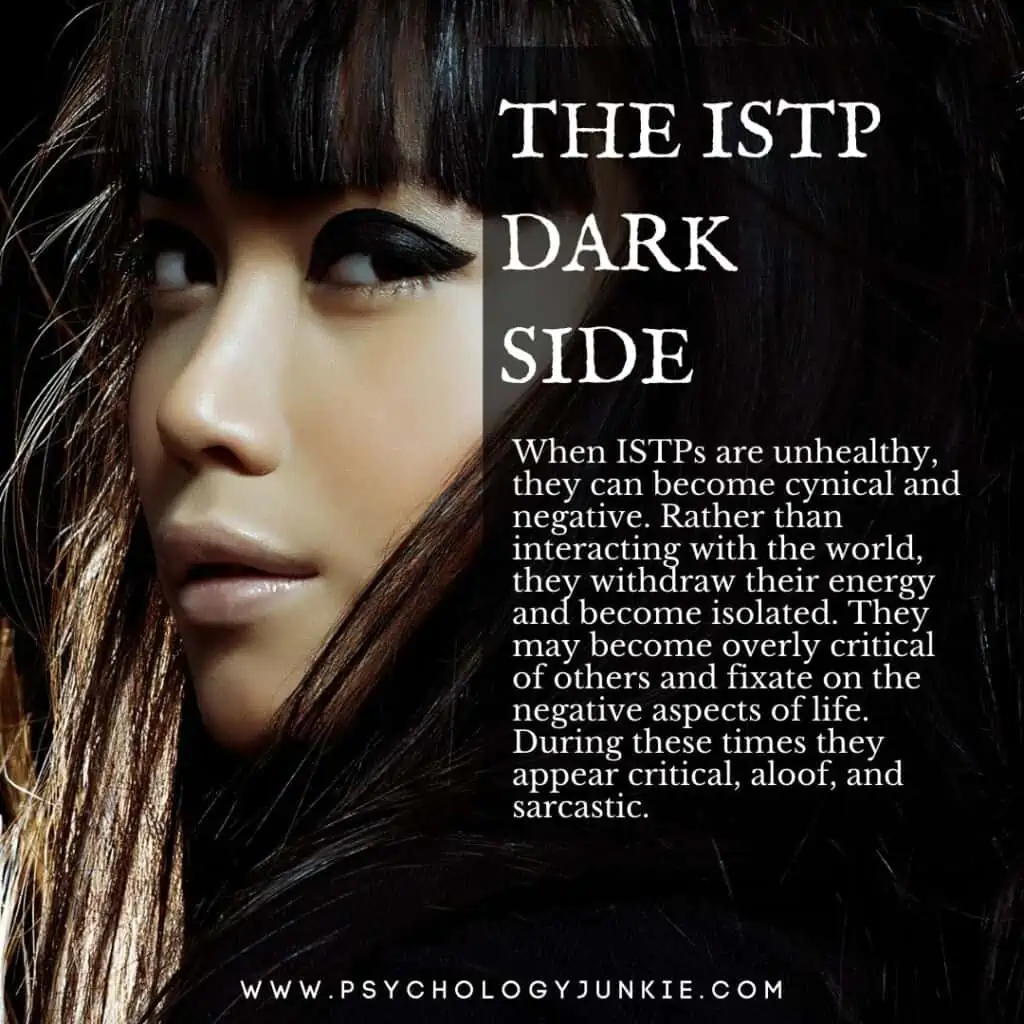
ISTPs are known for their logical, grounded approach to life. Often referred to as “the mechanics,” these types enjoy working with their hands and creatively experimenting with objects. They are quick-thinking and adaptable, often able to find creative solutions to difficult problems.
At their best, ISTPs are independent, resourceful people who live in the moment. Reasonable and grounded, they believe that actions speak louder than words. Helping people out in practical ways comes naturally to them, and they don’t expect (or want) a lot of fanfare as a result. They are curious and enjoy learning new things. Additionally, they are often very courageous and willing to take risks.
However, when ISTPs are unhealthy, they can become cynical and negative. Rather than interacting with the world, they withdraw their energy and become isolated. They may become overly critical of others and fixate on the negative aspects of life. Additionally, they may struggle with following through on their commitments and taking responsibility for their actions.
The Immature ISTP:
When ISTPs don’t grow and challenge themselves in healthy ways, they can become immature. When this happens, they tend to be dismissive of the feelings and needs of others. They can become insensitive and harsh, blurting out blunt truths without taking people’s feelings into consideration. Responsibilities fall by the wayside and they lose track of the long-term ramifications of their actions.
When ISTPs Are Stressed:
ISTPs tend to be calm and collected people who take a logical approach to life. However, when they are under stress, they tend to become impatient, irritable, and withdrawn. They can get stuck in analysis-paralysis instead of making productive moves to solve problems.
During cases of severe stress, ISTPs can experience a grip reaction. When this happens, they feel like they’ve flipped a switch and are out of control. They become more emotional and reactive than usual, and may feel hypersensitive or worried about betrayal or rejection. This can result in explosive or tearful outbursts that they later regret.
Finding Balance:
It’s important for ISTPs to find ways to explore both the introverted and extroverted sides of their personality. While they need ample time alone to process their thoughts and recharge, they also need to find ways to connect with the outside world. This can mean making time for friends and family, pursuing hobbies and interests that involve social interaction, or making real-world goals and striving to achieve them.
The ESFJ Dark Side
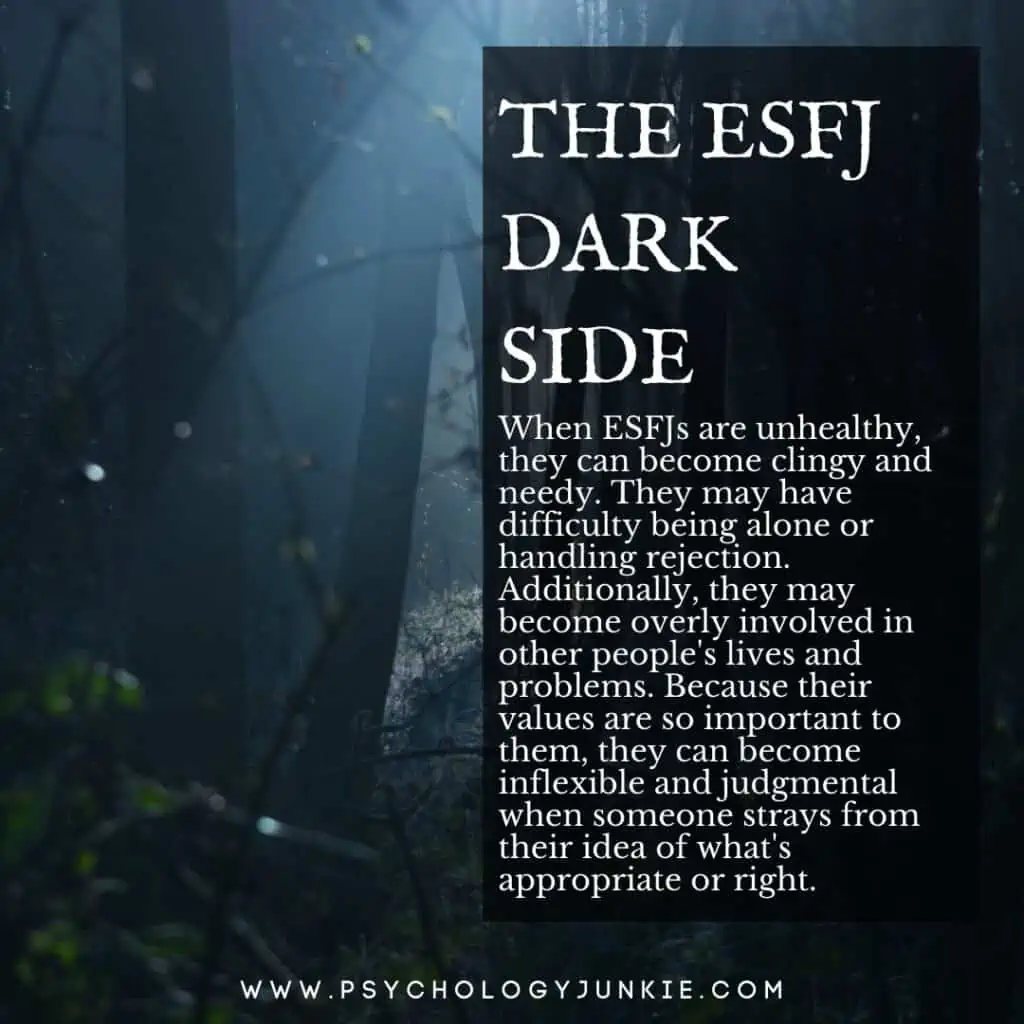
ESFJs are known for their caring, nurturing nature. These types enjoy being of service to others and often put the needs of others above their own. While they are usually warm and friendly, they also have a no-nonsense and pragmatic way about them.
At their best, ESFJs are compassionate, giving people who bring out the best in those around them. They are generous with their time, energy, and resources. One of their many skills is the ability to create stability and harmony in the world around them. They value security, friendship, and fairness.
However, when ESFJs are unhealthy, they can become clingy and needy. They may have difficulty being alone or handling rejection. Additionally, they may become overly involved in other people’s lives and problems. Because their values are so important to them, they can become inflexible and judgmental when someone strays from their idea of what’s appropriate or right.
The Immature ESFJ:
When ESFJs don’t grow and challenge themselves in healthy ways, they can become immature. When this happens, they tend to overly fixate on their relationships to the detriment of themselves. They may become people-pleasers who have difficulty saying “no” to others. They can become codependent and lose track of their own needs and wants. Additionally, they may become self-righteous and demanding, insisting that their values should be subscribed to by everyone else.
When ESFJs Are Stressed:
ESFJs tend to be calm and collected people who take a practical approach to life. However, when they are under stress, they tend to become tense and anxious. They may have difficulty sleeping or eating, and may start to feel physically ill. They may vent to friends or find themselves complaining in an effort to find consolation or helpful advice and validation.
During cases of severe stress, ESFJs can experience a grip reaction. When this happens, they become more reclusive and analytical. They may pick apart all their past mistakes and get stuck in a state of analysis-paralysis. Often they find themselves obsessed with logic and whether or not their thoughts make sense. They become self-critical and pessimistic and worry about going back out into the world.
Finding Balance:
It’s important for ESFJs to find ways to explore both the introverted and extroverted sides of their personality. While they need ample time with others to interact and connect, they also need to prioritize their own well-being. This means making time for themselves, setting aside time for self-care, and getting in touch with their own needs and wants. Journaling, spending time in nature, or meditating can be helpful for ESFJs when they need to recharge.
The ESTJ Dark Side
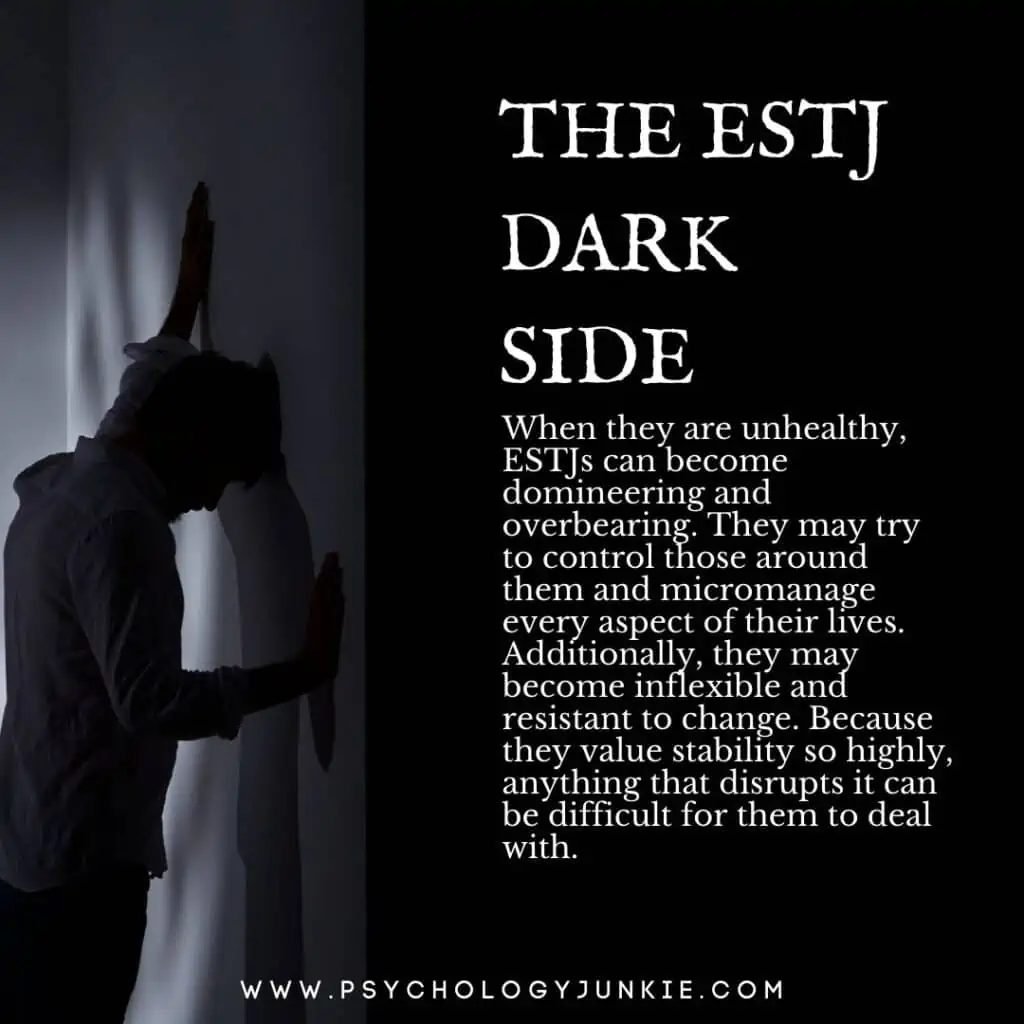
ESTJs are known for their practical, no-nonsense approach to life. These types are logical and efficient people who value order, structure, and stability. They often take on leadership roles and enjoy working towards tangible goals. While they can be tough and assertive, they also have a warm and caring side.
At their best, ESTJs are honest, reliable people who work hard to achieve their goals. They are loyal and supportive friends and family members. Communities often depend on them for their helpfulness and leadership. They uphold positive traditions and often have a collection of practical fixes to everyday problems. Their generosity with time and resources makes them a beacon of strength to many people around them.
However, when they are unhealthy, ESTJs can become domineering and overbearing. They may try to control those around them and micromanage every aspect of their lives. Additionally, they may become inflexible and resistant to change. Because they value stability so highly, anything that disrupts it can be difficult for them to deal with.
The Immature ESTJ:
When ESTJs don’t grow and challenge themselves in healthy ways, they can become immature. When this happens, they tend to fixate on their work to the detriment of their personal lives. They may become workaholics who have difficulty relaxing or enjoying themselves. At work or home they tend to be controlling and bossy, showing little regard for the points of view expressed by people who operate differently than they do. Often perfectionists, they may have impossibly high standards for themselves and those around them, and can be critical when those standards are not met.
When ESTJs Are Stressed:
ESTJs tend to be down-to-earth and even-tempered people. However, when they are under stress, they tend to become tense and anxious. They feel an urgent need to accomplish tasks and can become impatient with anyone who gets in the way or interrupts them.
During extreme cases of stress, ESTJs may experience what’s called a “grip reaction.” When this happens, they flip a switch and become more in touch with the feeling side of their personality. They withdraw from people and get absorbed in their own feelings and emotions, often feeling abandoned by others. They may become hypersensitive and overreact only to regret it later. During these times they may fixate on the negative and dwell on past hurts.
Finding Balance:
ESTJs need to find a balance between the introverted and extroverted sides of their personality. This means making time for themselves, setting aside time for self-care, and getting in touch with their own needs and wants. Additionally, they should create opportunities to nourish their relationships outside of work. Spending casual, low-key time with friends and family is extremely healthy. During these times they should try to actively listen to people who experience life differently than they do. This exposure to a variety of perspectives can help them to become balanced and understanding.
The ISFJ Dark Side
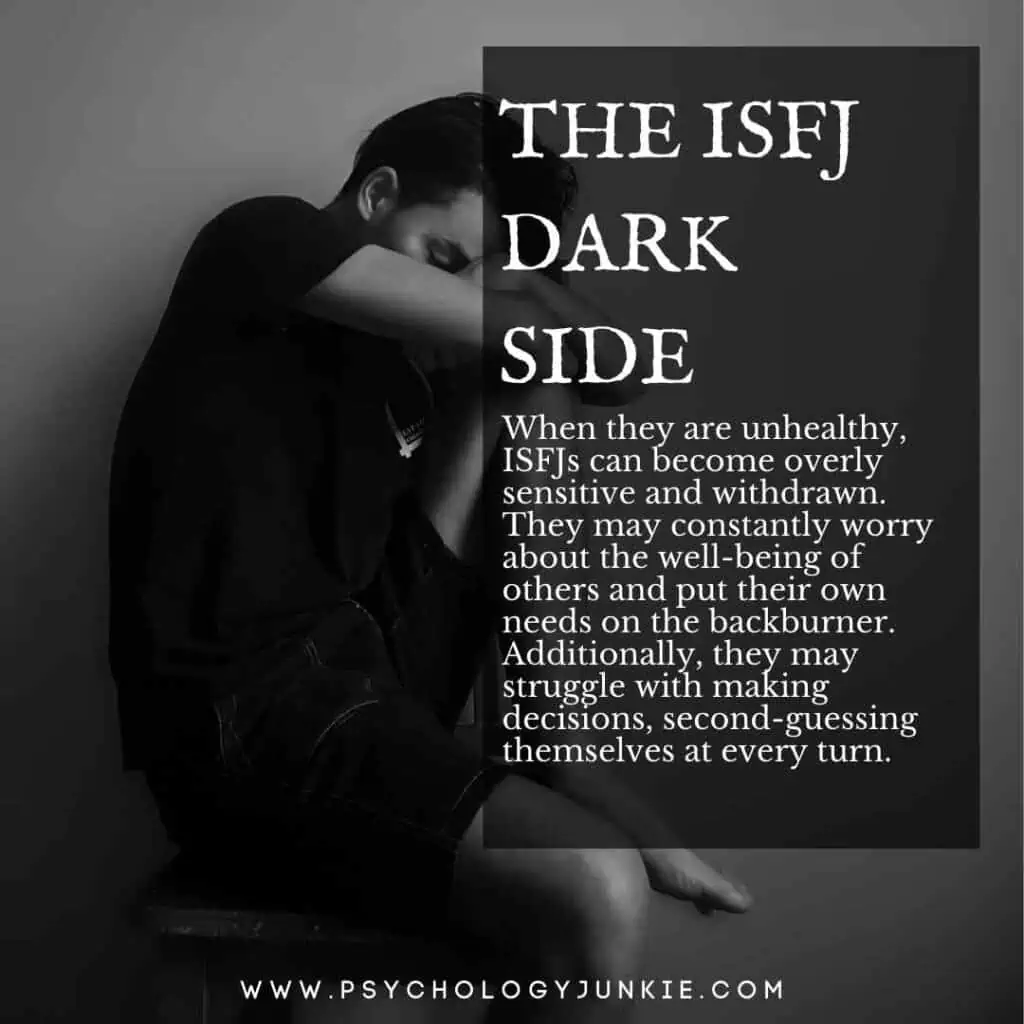
ISFJs are quiet and responsible people who strive to help others in practical ways. They are known for being thorough and detail-oriented, noticing specifics about people and their environment. They often put the needs of others before their own, and they value cooperation over competition.
At their best, ISFJs are gentle caretakers who create stability and harmony in their communities. Always ready to lend a helping hand, they are loyal and reliable friends and family members. They often go above and beyond to support the people they love, going out of their way to make sure their needs are met. On top of this, they are skilled at coming up with ways to commemorate and preserve positive traditions and memories.
However, when they are unhealthy, ISFJs can become overly sensitive and withdrawn. They may constantly worry about the well-being of others and put their own needs on the backburner. Additionally, they may struggle with making decisions, second-guessing themselves at every turn. When this happens, they can become indecisive and paralyzed by their own anxiety.
The Immature ISFJ:
When ISFJs don’t grow and challenge themselves, they can become immature. Immature ISFJs are rigid and inflexible, wanting things their own way and getting frustrated with any type of change. They often feel resentful of what they do for others and can be found complaining about how underappreciated they are. They might sulk or withdraw when they don’t get the appreciation they want or when someone upsets their routine.
When ISFJs are Stressed:
ISFJs tend to be gentle and patient people. However, when they are under stress they may become anxious and impatient. They can become preoccupied with all the ways things could go wrong and might fixate on past failures. Additionally, they may struggle to express their own needs, resulting in feelings of frustration and resentment.
During extreme cases of stress, ISFJs may experience what’s called a “grip reaction.” When this happens, they flip a switch and become more in touch with the intuitive side of their personality. Unfortunately, this doesn’t typically happen in a healthy way. During grip stress, their intuition shows up in worst-case scenario thinking and dramatic visions of doom and destruction. ISFJs often feel immobilized and overwhelmed during these periods.
Finding Balance:
It’s crucial for ISFJs to have a stable lifestyle with a sense of structure and routine. When ISFJs know what to expect, they can replenish their energy stores and enjoy the peace of mind that comes with regular quiet time for themselves. It’s also important for them to take time to experiment in the outside world. This can mean getting together with friends, helping out for a cause they believe in, or going to a book club! The comfort of predictability of home with the exposure to new and varied people is extremely healthy for them.
The ISTJ Dark Side
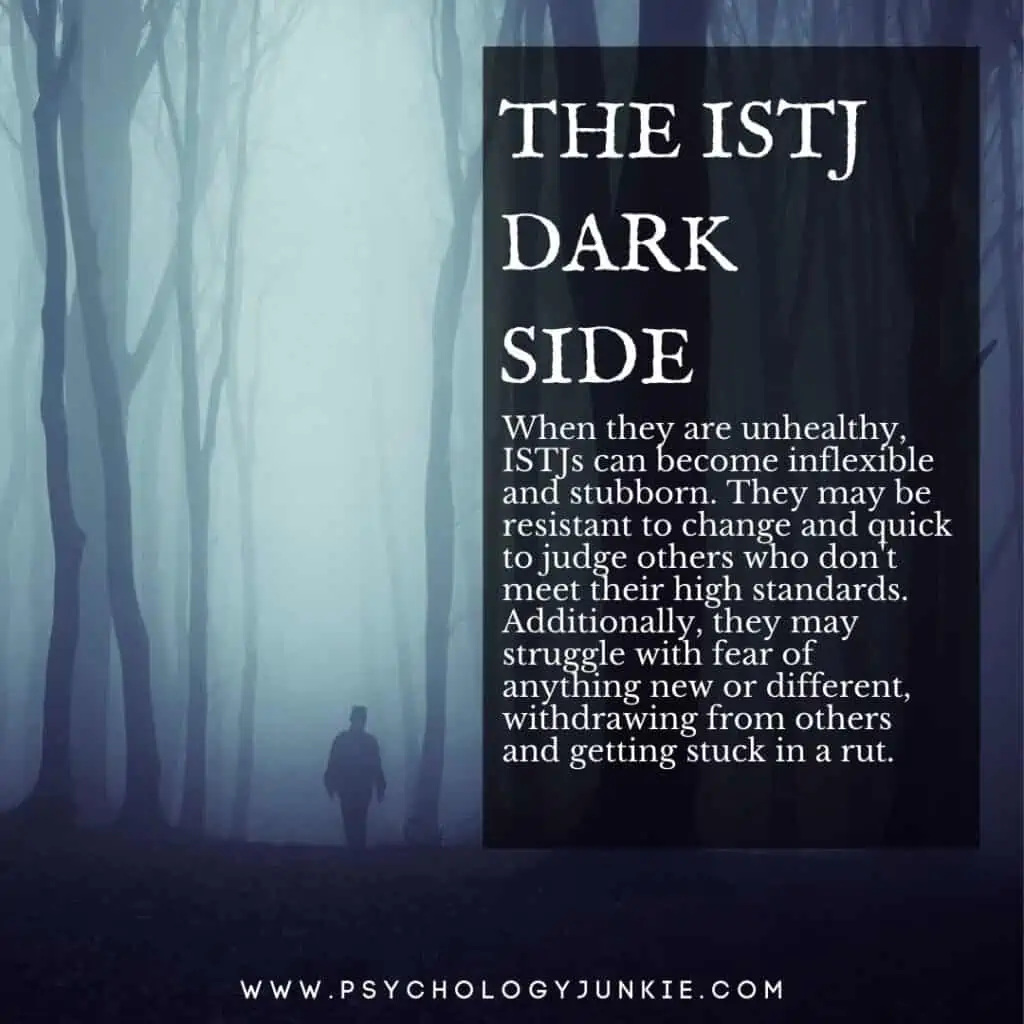
ISTJs are quiet and practical people who value order, security, and stability. They are known for being logical and systematic in their thinking, preferring to rely on facts and evidence over feelings or hunches. They often take a traditional approach to life, following well-known paths and trusting what they’ve learned through life experience.
At their best, ISTJs are responsible and dependable citizens who work hard to meet their responsibilities. They are patient and fair-minded, always willing to lend a helping hand. They take great pride in their work, whether it’s running a small business or keeping a household running smoothly. Diligence and attention to detail are their trademarks.
However, when they are unhealthy, ISTJs can become inflexible and stubborn. They may be resistant to change and quick to judge others who don’t meet their high standards. Additionally, they may struggle with fear of anything new or different, withdrawing from others and getting stuck in a rut.
The Immature ISTJ:
When ISTJs don’t grow and challenge themselves, they can become immature. Immature ISTJs are inflexible and set in their ways, unwilling to try new things or listen to others’ points of view. They might be judgmental and quick to find fault in others. Additionally, they may be emotionally insensitive and fail to consider the emotional impacts of their words on others.
When ISTJs are Stressed:
ISTJs tend to be quiet and controlled people with a grounded outlook on life. However, when they’re stressed, they can start snapping at others or withdrawing from social interaction altogether. Additionally, they may become obsessive about details and rules, needing everything to be just so in order to feel calm.
During extreme stress, ISTJs may have what’s called a “grip” reaction. During grip reactions, they become louder and more dramatic. They may envision dozens of worst-case scenarios and dwell on endless unforeseen dark possibilities. This state makes them feel scattered and unfocused.
Finding Balance:
It’s important for ISTJs to find ways to relax and have fun. While they need to honor their need for alone time and predictability, they also need to get comfortable with change. If their lifestyle is fairly stable and consistent, taking some time to try a new thing every week could be helpful. If there life is very unpredictable and erratic, they should seek out ways to make it more stable. As with all things, equilibrium is key.
Friendships should also not be cast aside by the ISTJ. It’s healthy for them to talk to a variety of people from different walks of life so that they can broaden their views and avoid getting stuck in a narrow way of thinking.
Read This Next: 21 Hobbies That ISTJs Love
What Are Your Thoughts?
Do you agree with this article? Do you have any other perspectives to share? Let us know in the comments!
Find out more about your personality type in our eBooks, Discovering You: Unlocking the Power of Personality Type, The INFJ – Understanding the Mystic, The INTJ – Understanding the Strategist, and The INFP – Understanding the Dreamer. You can also connect with me via Facebook, Instagram, or Twitter!
Subscribe to Our Newsletter

Want to discover more about personality type? Get the inside scoop with Susan Storm on all things typological, along with special subscriber freebies, and discounts on new eBooks and courses! Join our newsletter today!










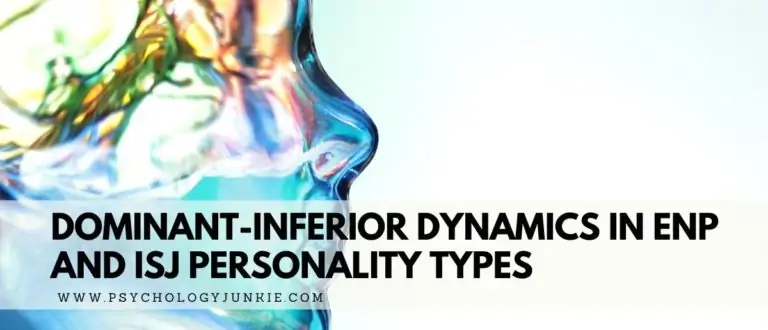
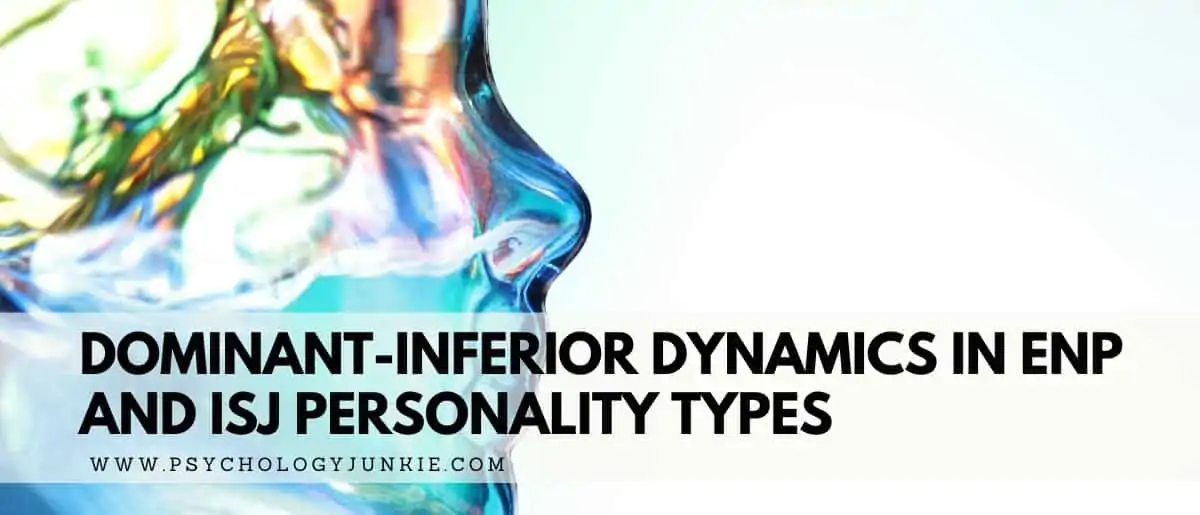
Could this be any more accurate!?
INTP: “Their internet browsers may have dozens of tabs left open on them as they try to research possibilities and find answers.”
Dozens? No, it’s *thousands*, Literally!
I was thinking the same thing! Only, thousands seems to be a bit high. How much RAM does your computer have?
I’ll say this with all my honestly, whatever you describe in each personality cannot be defined with just simple words as you use, when I read your content, I can’t help but feel frustrated of how this is just a surface of deep sea and you still don’t mention it to new readers and new Myers Briggs lovers. You are making walls indirectly of how each personality acts and how it should be. I honestly don’t support your content unless it improves in a way that makes it clear we are talking about a “human” not an animal or a thing. Please be more considerate in what you write, these topics cannot be described easily as it has an impact on how people see themselves and others, or at least write down that the topic is more deeper than you might think.
ISTP here…this article is very accurate for me! /blush
I’m either INTJ or INFJ, but I don’t react to stress by becoming reckless or impulsive. I may explode with anger, or I may just retreat to somewhere quiet where I can be alone. I still have enough intelligence to not do stupid things like waste money or crash a car or get drunk.